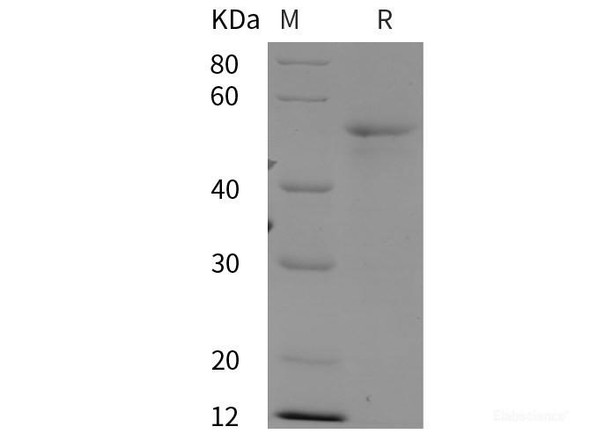Description
| Product Name: | Human ATXN3 Recombinant Protein |
| Product Code: | RPPB5847 |
| Size: | 10µg |
| Species: | Human |
| Target: | ATXN3 |
| Synonyms: | Ataxin-3, Machado-Joseph disease protein 1, Spinocerebellar ataxia type 3 protein, ATXN3, ATX3, MJD, MJD1, SCA3, AT3, JOS. |
| Source: | Escherichia Coli |
| Physical Appearance: | Sterile filtered colorless solution. |
| Formulation: | The ATXN3 protein solution contains 20mM Tris-HCl buffer (pH 7.5), 2mM DTT, 50mM NaCl and 10% glycerol. |
| Stability: | Store at 4°C if entire vial will be used within 2-4 weeks.Store, frozen at -20°C for longer periods of time. For long term storage it is recommended to add a carrier protein (0.1% HSA or BSA).Avoid multiple freeze-thaw cycles. |
| Purity: | Greater than 90.0% as determined by SDS-PAGE. |
| Amino Acid Sequence: | MESIFHEKQE GSLCAQHCLN NLLQGEYFSP VELSSIAHQL DEEERMRMAE GGVTSEDYRT FLQQPSGNMD DSGFFSIQVI SNALKVWGLELILFNSPEYQ RLRIDPINER SFICNYKEHW FTVRKLGKQW FNLNSLLTGP ELISDTYLAL FLAQLQQEGY SIFVVKGDLP DCEADQLLQM IRVQQMHRPK LIGEELAQLK EQRVHKTDLE RVLEANDGSG MLDEDEEDLQ RALALSRQEI DMEDEEADLR RAIQLSMQGS SRNISQDMTQ TSGTNLTSEE LRKRREAYFE KQQQKQQQQQ QQQQQQQQQQ QQQQGDLSGQ SSHPCERPAT SSGALGSDLG DAMSEEDMLQ AAVTMSLETV RNDLKTEGKK |
Ataxin 3 is otherwise known as Machado-Joseph disease protein 1. Machado�Joseph disease is a hereditary autosomal dominant neurodegenerative disorder. ATXN3 contains trinucleotide CAG repeats in the coding region, and the expansion of these repeats from the normal 13-36 to 68-79 causes the Machado-Joseph disease. ATXN3 is a poly-ubiquitin-binding protein whose cellular turnover is regulated by its catalytic activity.In addition, ATXN3 is a proteasome-associated factor which mediates the degradation of ubiquitinated proteins. ATXN3 folds reversibly using a single intermediate; partial destabilization of ATXN3 by chemical denaturation causes the formation of fibrillar aggregates by the non-pathological variant.Ataxin-3 interacts with the major histone acetyltransferases cAMP-response-element binding protein (CREB)-binding protein, p300, and p300/CREB-binding protein-associated factor and hinders transcription by these coactivators.
ATXN3 produced in E.Coli is a single, non-glycosylated polypeptide chain containing 370 amino acids (1-370 a.a.) and having a molecular mass of 42.4kDa.ATXN3 is purified by proprietary chromatographic techniques.
| UniProt Protein Function: | ataxin-3: Deubiquitinating enzyme involved in protein homeostasis maintenance, transcription, cytoskeleton regulation, myogenesis and degradation of misfolded chaperone substrates. Binds long polyubiquitin chains and trims them, while it has weak or no activity against chains of 4 or less ubiquitins. Involved in degradation of misfolded chaperone substrates via its interaction with STUB1/CHIP: recruited to monoubiquitinated STUB1/CHIP, and restricts the length of ubiquitin chain attached to STUB1/CHIP substrates and preventing further chain extension. In response to misfolded substrate ubiquitination, mediates deubiquitination of monoubiquitinated STUB1/CHIP. Interacts with key regulators of transcription and represses transcription: acts as a histone- binding protein that regulates transcription. Defects in ATXN3 are the cause of spinocerebellar ataxia type 3 (SCA3); also known as Machado-Joseph disease (MJD). Spinocerebellar ataxia is a clinically and genetically heterogeneous group of cerebellar disorders. Patients show progressive incoordination of gait and often poor coordination of hands, speech and eye movements, due to degeneration of the cerebellum with variable involvement of the brainstem and spinal cord. SCA3 belongs to the autosomal dominant cerebellar ataxias type I (ADCA I) which are characterized by cerebellar ataxia in combination with additional clinical features like optic atrophy, ophthalmoplegia, bulbar and extrapyramidal signs, peripheral neuropathy and dementia. The molecular defect in SCA3 is the a CAG repeat expansion in ATXN3 coding region. Longer expansions result in earlier onset and more severe clinical manifestations of the disease. 3 isoforms of the human protein are produced by alternative splicing. |
| UniProt Protein Details: | Protein type:DNA repair, damage; Transcription regulation; EC 3.4.19.12; Ubiquitin-specific protease; Protease Chromosomal Location of Human Ortholog: 14q21 Cellular Component: nucleoplasm; nuclear matrix; mitochondrial matrix; mitochondrial membrane; cytoplasm; nucleus; cytosol; nuclear inclusion body Molecular Function:identical protein binding; protein binding; omega peptidase activity; ubiquitin protein ligase binding; ubiquitin-specific protease activity; ATPase binding Biological Process: ubiquitin-dependent protein catabolic process; proteasomal ubiquitin-dependent protein catabolic process; nervous system development; synaptic transmission; transcription, DNA-dependent; regulation of transcription, DNA-dependent; nucleotide-excision repair; misfolded or incompletely synthesized protein catabolic process; intermediate filament cytoskeleton organization and biogenesis; microtubule cytoskeleton organization and biogenesis; actin cytoskeleton organization and biogenesis Disease: Machado-joseph Disease |
| UniProt Code: | P54252 |
| NCBI GenInfo Identifier: | 290457685 |
| NCBI Gene ID: | |
| NCBI Accession: | P54252.4 |
| Molecular Weight: | |
| NCBI Full Name: | Ataxin-3 |
| UniProt Protein Name: | Ataxin-3 |
| UniProt Synonym Protein Names: | Machado-Joseph disease protein 1; Spinocerebellar ataxia type 3 protein |
| Protein Family: | Histone-lysine N-methyltransferase |
| UniProt Gene Name: | ATXN3�� |
| UniProt Entry Name: | ATX3_HUMAN |






